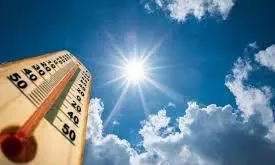
India records warmest October since 1901, unseasonably warm November expected
text_fieldsIndia has reported its warmest October since 1901, with the average temperature reaching 26.92 degrees Celsius, 1.23 degrees above the norm of 25.69 degrees Celsius, according to the India Meteorological Department (IMD).
Speaking in Delhi, IMD Director General Mrityunjay Mohapatra cited a lack of western disturbances and active low-pressure systems over the Bay of Bengal, which caused easterly winds to dominate, as the primary reasons for the warmer conditions.
October also saw higher-than-average minimum temperatures, registering 21.85 degrees Celsius, compared to the typical 20.01 degrees Celsius. This temperature spike is most notable in northwest India, where the expected cooler north-westerly winds were absent due to lingering monsoon conditions.
Temperatures in the region are predicted to remain 2-5 degrees above normal over the next two weeks before a gradual drop.
IMD noted that November is not officially part of winter in India, with December bringing early signs of the season and January and February considered the main winter months. However, the southern peninsula can expect above-average rainfall in November, especially in Tamil Nadu, Puducherry, Coastal Andhra Pradesh, Rayalaseema, Kerala, and parts of Karnataka due to the northeast monsoon.
IMD also pointed to ongoing neutral El Niño-Southern Oscillation (ENSO) conditions, which are predicted to gradually shift toward La Niña by December. The return of La Niña could usher in colder winter conditions by enhancing cold air flows across Afghanistan, Iran, and the Hindu Kush, potentially bringing colder-than-average temperatures to India.























